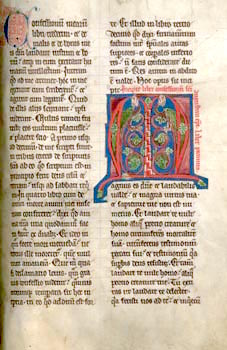
In the first section of ch.11 we read a long, but still summarized list, of God's sovereign action on Israel's behalf, now usually when people remind us of something, or multiple things, that they have done on our behalf we only have to wait a few seconds before they ask something they want of us; this isn't the case with God--since he is complete in and of himself--so in Deuteronomy (ch.11 v.3-7) something else must be going on. And that is in fact the case, the reason Moses shares these memories of God's sovereign action is so that Israel will reminded that God's sovereign action is not a memory, that they are covenant people. So, it makes sense that we hear the familiar plea (v. 1, 8) that Israel follow the law of the covenant. This charge is a call for Israel to be covenant people and part of being covenant people is faithfulness, both on the part of the Israelites and also on God's. It is because the Israelites are covenant people that they
will continue to see God's sovereign action among them. And that is expressed well in the second section of v.8 and on into v.9, "so that you may have the strength to go in and take over the land that you are crossing the Jordan to possess, and so that you may live long in the land that the LORD swore to your forefathers to give to them and their descendants, a land flowing with milk and honey." We
have heard that Israel's covenant faithfulness is part and parcel with them living "long in the land [...] flowing with milk and honey," but we haven't heard the first part before, "so that you may have strength to go in and take over the land." What we can learn from this new statement is that Israel will have the "strength" to conquer, in part because of their covenant faithfulness--Israel having a deep understanding of it's identity as the sovereign God's people--but more so Israel's strength will come from the knowledge that it is the Lord that has already gone before them.
This presents Israel's covenant relationship with God as an "if, then" relationship.
If Israel heeds God's commands
then they will receive blessing. I must admit this offends my theological sensibilities (a good thing for the Bible to do); I tend to think of God's inevitable overarching plan and this "if, then" thing just seems to complicate matters. But a fuller view shows that this "if, then" element is fundamental to covenant relationship. God desires, and of course by his grace, that we choose him by putting aside the often immediate pleasures of sin for the full pleasure of himself and his blessings. Further, this "if, then" bit isn't my own theological creation; the "if, then" relationship is described in v.13, faithfulness yields good crops (v.13-14). And in v.22 where out of covenant faithfulness sprouts more land. While the blessings are grand the curse is described in v.16-17: "Be careful, or you will be enticed to turn away and worship other gods and bow down to them.
Then the LORD's anger will burn against you, and he will shut the heavens so that it will not rain and the ground will yield no produce, and you will soon perish from the good land the LORD is giving you."
The chapter ends acknowledging the full reality of covenant, that is both blessing and curse. Moses tells Israel, and us, that both blessings and the curses be read from two different mountains (v.29) vividly showing the high stakes of covenant. We, as Christians, have been, "blessed [...] in the heavenly realms with every spiritual blessing in Christ" (Eph 1:3). That is, our role in covenant relationship is not to be mercenaries*, expecting blessings because of our great service; no we are called to serve Christ out of love for the grace he has lavished on us by separating us from our sins and unifying himself with our hearts.
*The Mercenary and Servant distinction is due to John Piper, click this link for the sermon that it comes from.









